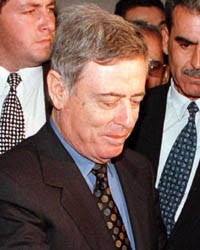I learned from my wife while reading newspapers on 3/31/2020 about the death of Abdel Halim Khaddam, in Paris. Far from his homeland in Syria, he is an extraordinary Syrian foreign minister and politician*
I got to know him during the period of the civil war in Lebanon and the Arab mediation in the seventies and eighties to resolve the conflict and assign Brother Lakhdar Brahimi to mediate and find a solution to the Lebanese-Arab-foreign conflict therein. Lakhdar Brahimi came to Damascus to meet with the Syrian side, and Syria was an important, if not essential, party in the Lebanese-Lebanese conflict.
He began his mission in Syria by trying to meet Abdel Halim Khaddam, the Syrian Foreign Minister at the time, who did not diplomatically set a date for him to meet him (in practice, he refused to meet him). He traveled to Kuwait and asked for my help. So I went to Damascus and met with President Hafez al-Assad about the matter and told him that Al-Akhdar was “one of us” (he was at the time). As a result of that interview, Al-Akhdar was summoned from Kuwait and the red carpet was rolled out for him, and that was the beginning of my direct relationship with Khaddam.
Then our relationship became closer and closer, and we both enjoyed our relationship with each other beyond the nature of normal relationships.
Then this relationship became closer and closer as the days went by, and we began to talk and exchange opinions on many Arab matters
Because I was aware that there were eavesdropping devices in his office, which was the nature of the situation at that time in Syria, I deliberately mentioned matters during our interviews that I knew that Abdel Halim Khaddam could not comment on, but my purpose was for this information to reach the parties through eavesdropping in his office. Supreme
I did not mention that he died in Paris in his palace there, because that raises the source of the palace and gives a misleading image of him, as the palace is the end and starting with it gives a misleading image of him.
Before I knew Abdul Halim Khaddam directly, I had heard about him from my late friend, Dr. Saadoun Hammadi, when they were both foreign ministers of their countries. Khaddam is an unusual foreign minister and he is not easy-going. He may have used the phrase “he was fierce in his situation, but I am not sure about that.”
Relations between us became closer, even though I did not occupy any responsible official position, as I was at the time deported in Beirut and exiled from Iraq, for reasons that there is no room to go into now, as Director General of the Center for Arab Unity Studies, which I had fundamentally participated in establishing in Beirut, and I took over The position of its general manager after it was not possible to find a suitable person for him due to the start of the civil war in Lebanon
Abdul Halim Khaddam was not an ordinary foreign minister during the rule of President Hafez al-Assad. He was a participant of President al-Assad and a subject of his reliance in Syrian and Arab foreign policy in particular.
During his time as Foreign Minister of Syria, then Vice President in the last two decades of the twentieth century, our relationship became closer. He was interested in getting my opinion on many Arab matters that were taking place in the region.
During the first period of this relationship, the late Rafik Hariri did not play an important role in Lebanon, and the influence of this role was increasing. I remember that he asked me once, while discussing the possibility of nominating the late Rafik Hariri as Prime Minister of Lebanon, about my opinion on that, and I answered him with a question: Who will receive Lebanese Prime Minister Rafik Hariri in Riyadh when he visits Saudi Arabia? We laughed together, and I left without answering my question and we laughed together, but the stage of influence The role of Rafik Hariri increased over Khaddam later, and he became influenced, not just influenced, by him
Khaddam's star began to decline after the death of the late father and the assumption of power by the son, Bashar, although he was a major actor in the formalities and transfer of power after the father's death.
After the decline of his star after son Bashar assumed power and left the position of vice president, I visited him in Damascus and that visit was my last meeting with him.
During his stay in Paris, he tried to play a role with the Syrian opposition, but the objective circumstances had changed and were not helpful.
Abdul Halim Khaddam remains a distinguished person in his time, in his position, and in the events in which he played a role, and left his mark on them, both positive and negative.
Abdul Halim Khaddam was a major influential factor in Syrian-Iraqi relations. Because of his dispute with President Saddam, he was a real obstacle to the rapprochement between Syria and Iraq, despite Saddam’s attempt to appease him. The roots of this negative relationship go back to an incident during the meeting arranged by the late King Hussein between Presidents Hafez al-Assad and Saddam Hussein on the Syrian-Iraqi border, which left its negative effects* on the relationship between Saddam and Khaddam and thus between Iraq and Syria
All the great people in their history have their positives and negatives, and history is the one that judges after examining all the facts, and this is something that is no longer easy or possible to determine?
But Abdul Halim Khaddam remains an extraordinary Syrian politician who left his mark on Syrian history, both positively and negatively

